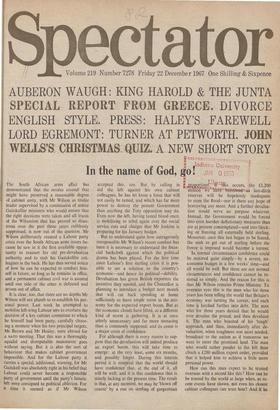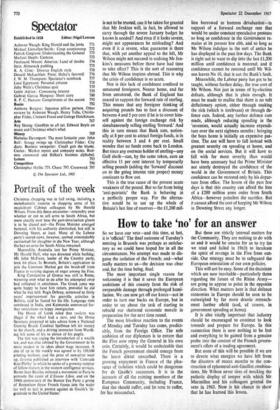In the name of God, go! JAN o 1c,'53 The
South African arms affair has demonstrated that the modus vivendi that might have preserved a reasonable degree of .cabinet unity, with Mr Wilson as titular leader supervised by a commission of senior Gaitskellite ministers who would ensure that the right decisions were taken and all traces of the Wilsonism that has proved so disas- trous over the past three years ruthlessly suppressed, is now out of the question. Mr Wilson deliberately created a Labour party crisis over the South African arms issues be- cause he saw in it the first available oppor- tunity to reassert his old pre-devaluation authority and to stab his Gaitskellite col, leagues in the back. He has thus served notice of how he can be expected to conduct him- self in future, so long as he remains in office, and a permanent cabinet civil war is assured until one side or the other is defeated and driven out of office.
It is clear, too, that there are no depths Mr Wilson will not plumb to re-establish his per- sonal power. Last week he attempted to mobilise left-wing Labour MPS to overturn the decision of a key cabinet committee to which he himself had been party, carefully choos- ing a moment when his two principal targets, Mr Brown and Mr Healey, were abroad for a NATO meeting. That this was a thoroughly squalid and disreputable manoeuvre goes without saying. But it is also the sort of behaviour that makes cabinet government impossible. And for the Labour party it carries a special, additional, warning, for Mr Gaitskell was absolutely right in his belief that Labour could never become a responsible Party of government until the party's lunatic left were consigned to political oblivion. For a time it seemed as if Mr Wilson accepted this, too. But by calling in aid the left against his own cabinet colleagues, he has let loose a force that will not easily be tamed, and which has far more power to destroy the present Government than anything the Tory opposition may do. Even now the left, having tasted blood once, is mobilising to rebel again over the social service cuts and charges that Mr Jenkins is preparing for his January budget.
But to understand quite how outrageously irresponsible Mr Wilson's recent conduct has been it is necessary to understand the finan- cial backcloth against which the political drama has been played. For the first time since Labour's first sterling crisis it is pos- sible to see a solution to the country's economic—and hence its political—debility. Devaluation has given British exporters the incentive they needed, and the Chancellor is planning to introduce a budget next month that will cut back spending at home sufficiently to leave ample room in the eco- nomy for the expected export boom. But as the economic clouds have lifted, so a different kind of storm is gathering. It is at once utterly unnecessary and far more menacing than is commonly supposed; and its cause is a major crisis of confidence.
For although there is every reason to sup- pose that the devaluation will indeed produce an export boom, this will take time to emerge: at the very least, some six months, and possibly longer. During this interim period it is essential that the world should have confidence that, at the end of it, all will be well; and it is this confidence that is utterly lacking at the present time. The result is that, at any moment, we may be 'blown off course' by a run on sterling of gargantuan Juno2540:xilitaMis occurs, the £1,200 anon n ti6frttilittloxas last-ditch reserves will be hopelessly inadequate to stem the flood—nor is there any hope of borrowing any more. And a further devalua- tion would serve no purpose whatever. Instead, the Government would be forced into even harsher deflationary measures than are at present contemplated—and into block- ing or freezing all externally held sterling. Moreover, once this last began to be feared, the rush to get out of sterling before the freeze is imposed would become a torrent.
In normal circumstances confidence could be restored quite simply—by a severe, no- nonsense budget in a few weeks' time—and all would be well. But these are not normal circumstances and confidence cannot be re- stored so simply. And the reason for this is that Mr Wilson remains Prime Minister. To overseas eyes this is the man who for three years has been telling the world that Britain's economy was turning the corner, and each time it lurched further into debt. The man who for three years denied that he would ever devalue the pound, and then devalued it. The man who boasted of his 'tough' approach, and then, immediately after de- valuation, when toughness was most needed, broadcast to the nation as if tomorrow we were to enter the promised land. The man who would rather pander to the left than clinch a £200 million export order, provided that it helped him to achieve a little more personal power.
How can this man expect to be trusted overseas with a record like this? How can he be trusted by the world at large when, as re- cent events have shown, not even his closest cabinet colleagues can trust him? And if he is not to be trusted, can it be taken for granted that Mr Jenkins will, in fact, be allowed to carry through the severe January budget he knows is needed? And even if it looks severe, might not appearances be misleading? And even if it is severe, what guarantee is there that, with yet another appeal to the left, Mr Wilson might not succeed in undoing Mr Jen- kins's measures before these have had time to take effect? This is the sort of reasoning that Mr Wilson inspires abroad. This is why the crisis of confidence is so acute.
Nor is this lack of confidence confined to untutored foreigners. Nearer home, and far from untutored, the Bank of England has ceased to support the forward rate of sterling. This means that any foreigner thinking of acquiring pounds has to face a discount of between 4 and 5 per cent if he is to cover him- self against the foreign exchange risk by simultaneously selling sterling 'forward.' And this in turn means that Bank rate, notion- ally at 8 per cent to attract foreign funds, is in reality between 3 and 4 per cent. Small wonder that no funds come back to London. But since any overseas holder of sterling—any Gulf sheik—can, by the same token, earn an effective 11 per cent interest by temporarily selling pounds (adding the 'forward' discount on to the going interest rate proper) money continues to flow out.
This is the true cause of the present acute weakness of the pound. But so far from being `anti-patriotic' the Bank is behaving in a perfectly proper way. For the alterna- tive would be to use up the whole of Britain's last line of reserves—the £1,200 mil- lion borrowed to buttress devaluation—in support of a forward exchange rate that would be under constant speculative pressure so long as confidence in the Government re- mains at its present low ebb, and so long as Mr Wilson indulges in the sort of antics he has displayed in the past few days. The Bank is right not to want to dip into the last £1,200 million until confidence is restored; and if confidence cannot be restored until Mr Wil- son leaves No 10, that is not the Bank's fault.
Meanwhile, the Labour party has got to be taught, without further delay, the true cost of Mr Wilson. Not just in terms of by-election defeats, although that is plain enough. It must be made to realise that there is no soft deflationary option, either through soaking the rich (which is irrelevant) or through de- fence cuts. Indeed, any further defence cuts made, although reducing spending in the 'seventies, would actually increase expendi- ture over the next eighteen months : bringing the boys home is initially an expensive pas- time. The axe will have to fall instead with greatest severity on spending at home, and on the social services. But it will have to fall with far more severity than would have been necessary had the Prime Minister not utterly destroyed the confidence of the world in the Government of Britain. This confidence can be restored only by his depar- ture from office. The lesson of the past few days is that this country can afford the loss of a £200 million arms order from South Africa—however pointless the sacrifice. But it cannot afford the cost of keeping Mr Wilson in Downing Street any longer.



































